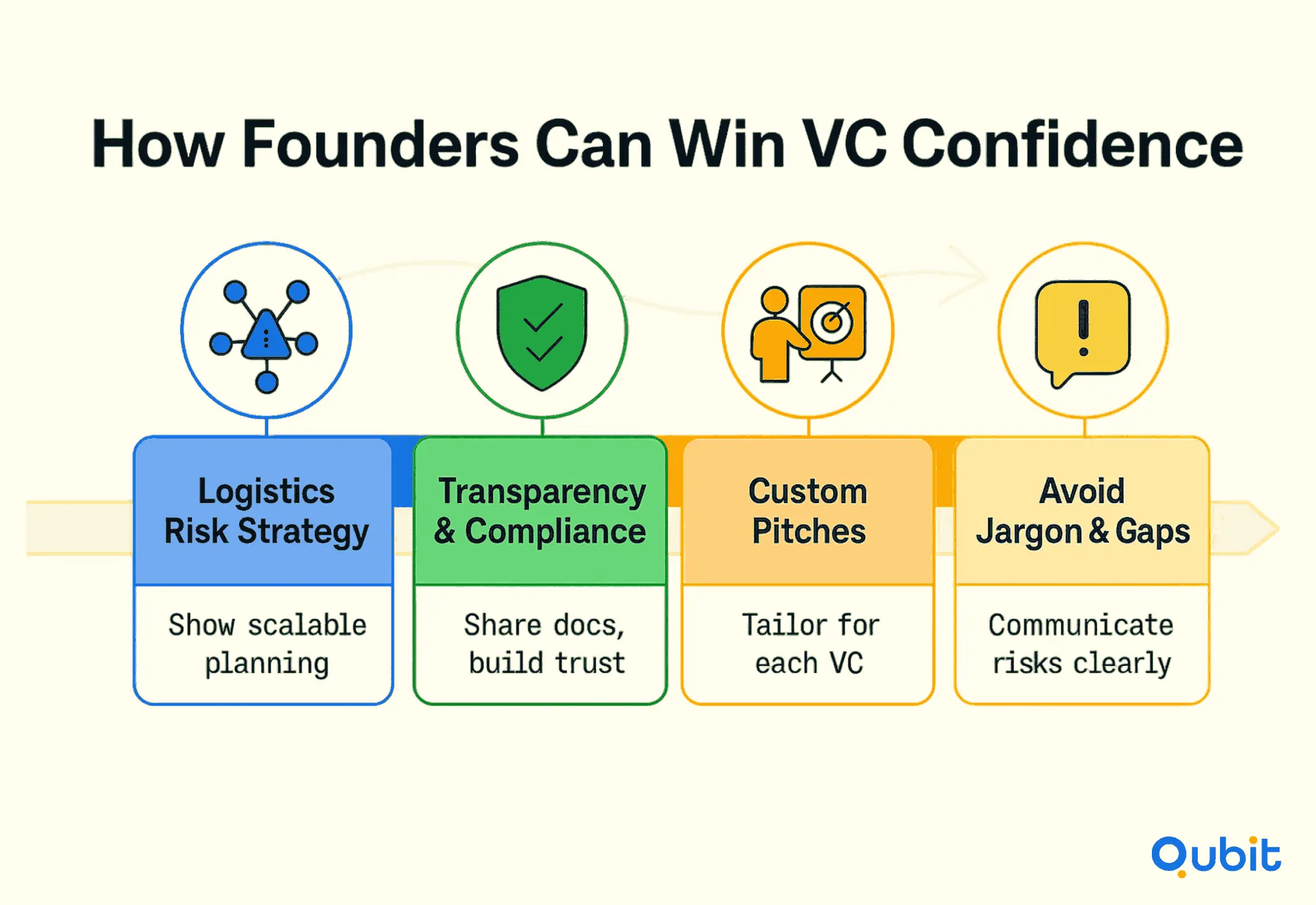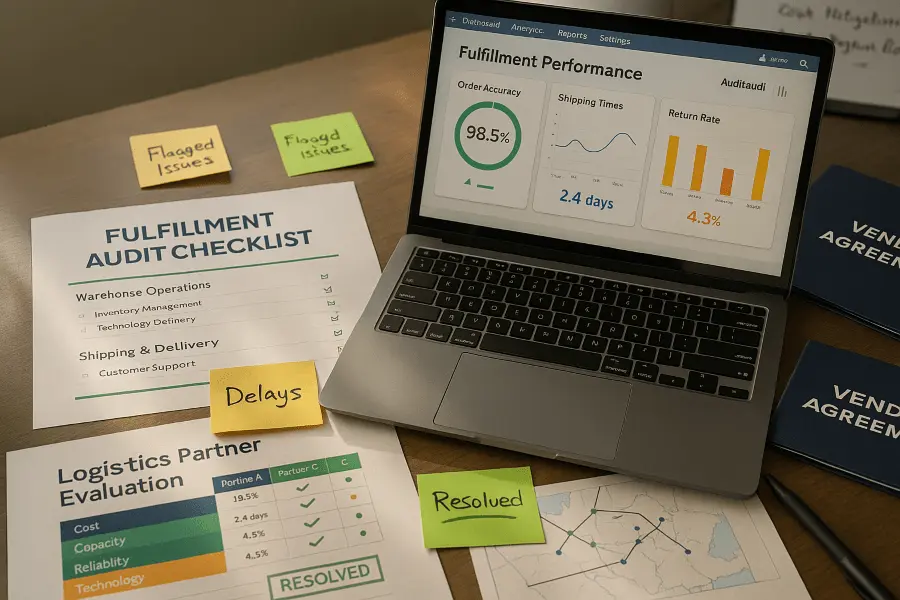Investor confidence often hinges on demonstrating operational resilience, especially in fulfillment and logistics. For e-commerce founders, these areas represent critical risks that can impact scalability and profitability. Investors scrutinize supply chain efficiency, inventory management, and fulfillment strategies during due diligence, making it essential to address vulnerabilities beforehand.
This blog explores actionable insights to mitigate logistics risk, optimize supply chain operations, and prepare for investor evaluations. Let’s dive into strategies that ensure your business is ready to impress during due diligence.
Assessing Day-to-Day Operations
A comprehensive review of your daily operations is essential. Investors will look at order processing, fulfillment efficiency, customer service, inventory management, and supplier relationships to gauge scalability and reliability. Key areas to address include:
- Order Processing & Fulfillment:
Demonstrate streamlined, automated systems for order tracking, inventory management, and shipping. Highlight any integrations you use to minimize manual work and errors. Efficient, integrated fulfillment processes are a strong signal to investors. - Returns & Refunds:
Clearly outline your return and refund policies. Show how these policies support customer satisfaction and operational efficiency. - Customer Service:
Provide data on customer satisfaction and responsiveness. Multiple support channels (email, chat, phone) and strong feedback scores reduce perceived risk. - Inventory Management:
Track inventory turnover rates, supply chain efficiency, and storage costs. Investors want to see that you can balance stock availability with cost control and avoid both stockouts and overstocking. - Supplier Relationships:
Document supplier reliability, contract terms, and any dependencies. Over-reliance on a single supplier is a red flag; show diversification where possible
Advice for Founders on Approaching VCs
Securing venture capital funding can be a pivotal moment for any startup, but the process requires careful preparation and strategic thinking. Founders must understand what investors prioritize and tailor their approach accordingly.

1. Highlighting Logistics Risk Management
Investors often scrutinize how startups handle logistics risk, as it directly impacts scalability and operational efficiency. Demonstrating robust strategies in this area can significantly boost investor confidence. For instance, the hampr case study illustrates how effective logistics planning can attract substantial funding. Hampr raised over $10M, showcasing the importance of aligning logistics with investor expectations.
2. Transparency During Due Diligence
Transparency is a cornerstone of successful VC engagement. Founders should ensure their compliance measures and operational practices are well-documented and accessible. Intertwining regulatory insights with logistics considerations, ecommerce data privacy compliance investors provides an analytical backdrop that complements your understanding of investor due diligence in managing risk. This approach not only builds trust but also demonstrates a commitment to mitigating risks effectively.
3. Customizing Your Pitch
Tailoring your pitch to address specific VC priorities is essential. Investors are drawn to presentations that align with their focus areas, whether it's market potential, team expertise, or innovative solutions. Founders should research each VC’s portfolio and preferences to craft a compelling narrative that resonates.
4. Avoiding Common Pitfalls
One frequent mistake is overloading pitches with technical jargon or irrelevant details. Instead, focus on clear, concise communication that emphasizes your startup’s value proposition. Another misstep is neglecting to address potential challenges; acknowledging risks and presenting mitigation strategies can strengthen your credibility.
If investors keep asking “why now?”, fundraising challenges in ecommerce breaks down the usual blockers, thin margins, choppy CAC, and slow payouts. It shows how to present cohort quality (LTV/CAC, payback windows) without fluff.
Modern Supply Chain Risk Management Strategies
Enhance Visibility & Collaboration
- Invest in real-time inventory tracking, centralized data platforms, and automated order management.
- Foster close collaboration with suppliers and logistics partners to quickly identify and resolve issues.
- Enhanced visibility and collaboration are cited by over half of supply chain leaders as the top opportunity for risk reduction.
Use Technology & AI
- Use AI and advanced analytics to forecast demand, optimize transportation, and automate inventory management.
- Predictive analytics help anticipate shortages and balance stock levels, while automation in warehouses streamlines order processing and fulfillment.
Diversify Suppliers & Distribution
- Avoid over-reliance on single suppliers or logistics partners by implementing dual-sourcing and alternative distribution networks.
- Regularly assess supplier reliability and maintain contingency plans for critical trade lanes and fulfillment partners.
Embrace Sustainability & Compliance
- Adopt sustainable practices such as eco-friendly packaging, carbon-neutral shipping, and energy-efficient warehousing.
- Ensure compliance with ESG (Environmental, Social, Governance) standards, which are increasingly scrutinized during investor due diligence.
Manage Cybersecurity & Digital Risks
- As supply chains become more digitized, invest in robust cybersecurity to protect sensitive data and ensure business continuity.
- Embed digital risk management across procurement, compliance, and logistics operations.
Proactive Planning & Scenario Analysis
- Conduct regular scenario analyses to identify vulnerabilities and quantify their impact using models like Value at Risk (VaR).
- Prioritize risks based on potential business impact and implement targeted mitigation strategies supported by real-time monitoring tools.
Best Practices for Investor-Ready Logistics
- Document Everything:
Maintain up-to-date SOPs, supplier contracts, logistics agreements, and compliance records for transparency during due diligence. - Benchmark Performance:
Compare your logistics and fulfillment metrics against industry standards to identify strengths and areas for improvement. - Showcase Resilience:
Provide examples of how your business has handled disruptions—such as supply shortages or shipping delays—to demonstrate operational agility. - Invest in Relationships:
Build strong, collaborative relationships with suppliers and logistics partners to improve reliability and reduce risk.
Looking Ahead: Building a Resilient, Scalable Supply Chain
The e-commerce landscape in 2025 demands a holistic, technology-enabled approach to logistics and fulfillment risk management. By embracing AI, enhancing visibility, diversifying suppliers, and embedding sustainability and compliance into your operations, you’ll not only meet investor expectations but also position your business for long-term success.
Investors are looking for founders who demonstrate both operational excellence and the foresight to adapt to an ever-changing global environment. Proactively addressing logistics risks and optimizing your supply chain will help you stand out in due diligence and build a business that thrives, no matter what challenges arise.
Conclusion
A well-crafted pitch deck is more than just a presentation; it’s a strategic tool that can significantly reduce logistics risks and enhance investor confidence. Throughout this blog, we’ve explored actionable strategies to create a clear, data-driven pitch deck that resonates with stakeholders. From identifying key insights to structuring your narrative effectively, these approaches are designed to help you stand out in competitive markets.
The importance of aligning your pitch deck with data-driven insights cannot be overstated. By doing so, you not only address potential risks but also demonstrate preparedness and foresight, qualities that investors value highly.
If you’re looking to turn logistics risk into investor confidence, at Qubit we understand fulfillment SLAs, last-mile costs, and inventory turns. De-risk your pitch with our ecommerce fundraising assistance and book a quick deck audit.
Key Takeaways
- E-commerce founders must proactively address fulfillment and logistics vulnerabilities.
- Data-driven operational metrics and clear cost-savings strategies build investor confidence.
- Tailored pitch strategies that align with investor priorities drive successful funding outcomes.
Frequently asked Questions
What are the main logistics risks in ecommerce?
Operational delays, inefficient fulfillment processes, and escalating costs are among the primary logistics risks in ecommerce. Founders can address these challenges by implementing advanced monitoring systems and optimizing workflows to ensure seamless operations.






